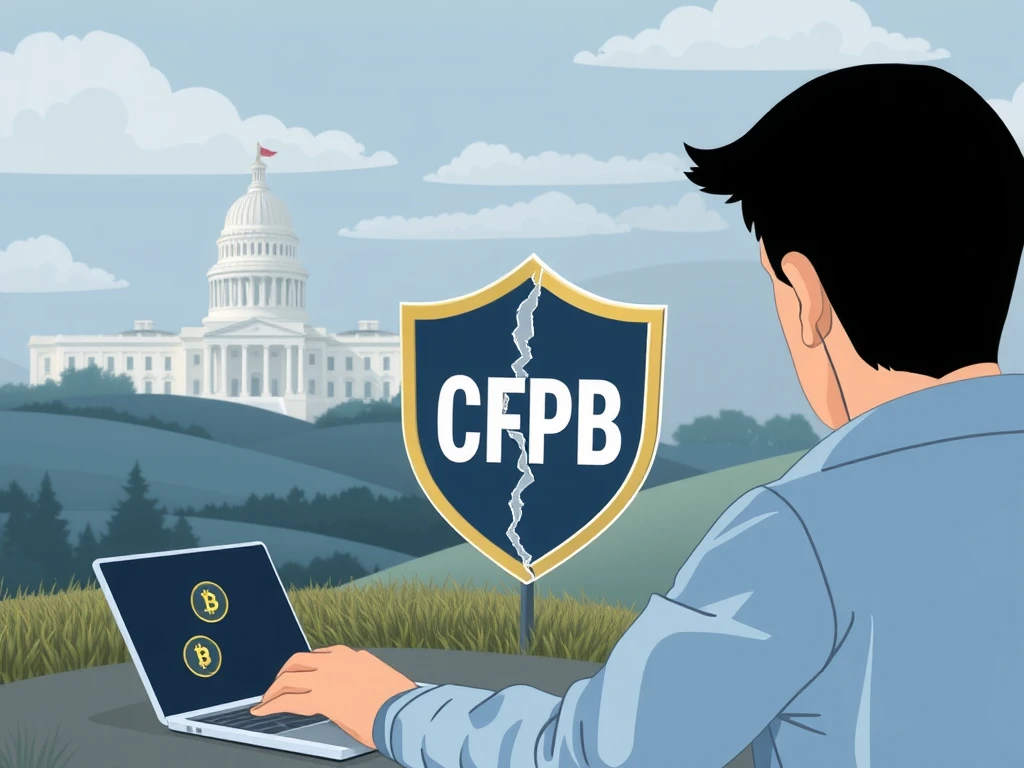Urgent: Crypto Users Exposed as Trump Weakens Consumer Watchdog

The safety net for crypto users in the United States appears to be fraying. Recent actions by the Trump administration have significantly impacted the Consumer Financial Protection Bureau (CFPB), an agency designed to safeguard consumers in the financial sector. This shift raises serious concerns about who is left to protect individuals navigating the complexities of the cryptocurrency market.
What Happened to the CFPB Under the Trump Administration?
The Consumer Financial Protection Bureau (CFPB) was established following the 2008 financial crisis as part of the Dodd-Frank Act. Its mandate was to create and enforce rules for financial institutions, including banks and lenders, to protect consumers from predatory practices. From its inception, the agency faced criticism from those advocating for less government intervention and financial industry players.
Under the Trump administration, efforts to reduce the size and scope of the federal government led to significant changes at the CFPB. These actions included:
- Cutbacks in staffing and resources.
- Halting or slowing down enforcement actions against financial firms.
- Public criticism and calls for streamlining or even eliminating the agency from some political figures and industry leaders.
The recent resignation of a high-ranking enforcement director, reportedly citing “thoughtless” cutbacks, highlights the internal impact of these changes. The stated goal of these reforms was often presented as reducing burdens on businesses and fostering innovation, but critics argue the primary outcome is diminished consumer protection.
How Does a Weakened CFPB Impact Crypto Users?
While the CFPB isn’t solely focused on crypto, its broad authority covers financial products and services that interact with the crypto space, such as payment apps, exchanges handling fiat currency, and potentially certain stablecoin activities. When exchanges face issues like account freezes, unresponsive support, or other service disruptions, users traditionally have limited avenues for recourse. The CFPB was one potential agency where users could file complaints, hoping for investigation or action.
Data indicates significant user complaints against crypto platforms have been filed with the agency. For example:
- Coinbase has received over 8,000 complaints.
- Kraken has received 338 complaints.
Reports from users describe being locked out of accounts for extended periods with no effective communication from platforms. With the CFPB‘s enforcement capabilities reduced, these crypto users may find it even harder to resolve such issues, leaving them vulnerable with few places to turn for help or mediation.
Why Did Some Crypto Firms Support Weakening Consumer Protection?
Ironically, major players in the crypto industry, including CEOs of prominent exchanges, have publicly supported scaling back the CFPB. Their arguments often centered on claims that the agency was unconstitutional or that its regulations stifled innovation in the US. Some industry figures saw the Trump administration’s approach as an opportunity to reshape crypto regulation in a way more favorable to business growth.
While the industry advocates for regulatory clarity and innovation, the consequence of a less active consumer watchdog is that their own customers face increased risk. This creates a paradox where companies championing a hands-off regulatory environment inadvertently expose their user base to potential harm without a clear path for resolution when problems arise.
What Are the Legal and Advocacy Efforts Pushing Back?
The changes at the CFPB have not gone unchallenged. Consumer advocates and employee unions representing CFPB staff have voiced strong concerns and pursued legal action. They argue that the rapid dismantling of the agency undermines crucial consumer protection and may have been implemented without proper authorization.
Legal cases are underway questioning the legality of actions taken to reduce the agency’s operations and enforcement capacity. These efforts seek to compel the administration to maintain the CFPB’s intended function and ensure accountability for financial firms. The outcome of these legal battles could determine the future effectiveness of the agency in protecting consumers, including crypto users.
What’s the Outlook for Crypto Regulation and Consumer Safety?
The current environment presents a complex picture for crypto regulation and user safety. While discussions about specific crypto legislation continue in Congress, the foundational layer of general financial consumer protection provided by agencies like the CFPB appears diminished under the Trump administration.
Political debates continue regarding the agency’s role, with some lawmakers still advocating for significant reforms. Meanwhile, crypto users must exercise increased caution, as the traditional avenues for resolving disputes with financial platforms may be less effective. The situation underscores the need for clear regulatory frameworks that support innovation while ensuring robust safeguards for individuals participating in the digital asset economy.
In summary, the actions taken against the CFPB by the Trump administration, while supported by some in the crypto industry, have created a void in consumer protection. This leaves crypto users potentially more exposed to issues like account problems and unresponsive platforms, with limited recourse. The ongoing legal and political debates highlight the critical need to balance innovation with effective safeguards in the evolving financial landscape.








